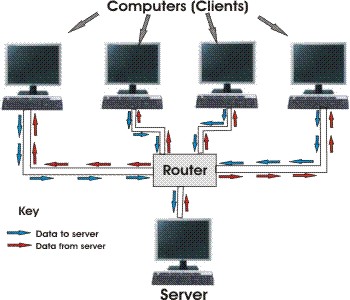
Networking
What is a network ?
A network is two or more computers connected together by cables (the most popular and cheapest method) or by some sort of radio controlled device (more expensive but supposed to be better). There are two types of network, Client Server and Peer to Peer,(shown below).
What does a network do?
A network connects computers and computer equipment together so that a company, or any computer users can share the resources. A good example of a shared resource is a printer, where it would be too costly to attach a printer to each computer (client) and also impractical so one printer shared between a number of computers (clients) would be more practical and cheaper so they are all connected together so that all the resources can be shared.
How do computers communicate on a network ?
Basically, each computer has a unique address, this address is in the form of four sets of numbers separated by a dot, for example, some popular addresses for a home network are: 192.168.0.1, 192.168.0.2, 192.168.0.3, etc. and all computers on a network have the same kind of address.
As each computer's address is unique, (there cannot be two or more computers on the same network with the same address), the message sent from one computer will reach the computer it is sent to. Having said that, computing and networking is not an exact science and things can go wrong.
 |
 |
Client
/ Server network |
Peer to Peer network |
The smallest network you can make is two computers, the largest, well.................. the Internet is a quite large network, computer's from all over the world are connected to it, but having said that, it isn't really one large network, in essence it is quite a few smaller networks all joined together.
For example, I am on BTInternet (unfortunately) and my computer would be attached to and part of the BTInternet network, you will be on another Internet Service Provider's (ISP) network, ie. Pipex and fred down the road would be on another, ie. tiscali so we now have three smaller networks with a lot of computers connected to each, all joined together to form a larger network consisting of the three named networks, ie. BTInternet, Pipex and Tiscali.
Now, if X number of a company's small networks join together we get a bigger network and that could then become the Internet. Whether you wish to view it as one big network or a lot of smaller company's networks all joined together is a matter of preference.
OK, going back to the unique numbering system of computer's on a network, we have already said that there cannot be more than one computer with the same address on a network, so what would happen if say, three home networks with computer addresses of 192.168.0.1, 192.168.0.2 and 192.168.0.3 were to come on to the Internet?
The answer is that on an ISP's network, you are given a unique number, the fact that your three computer home network has the same addresses as fred's down the road makes no difference to the individual Internet Service provider's (ISP) network so therefore all computers on the Internet run happily together.
